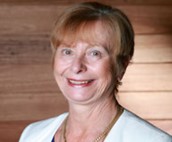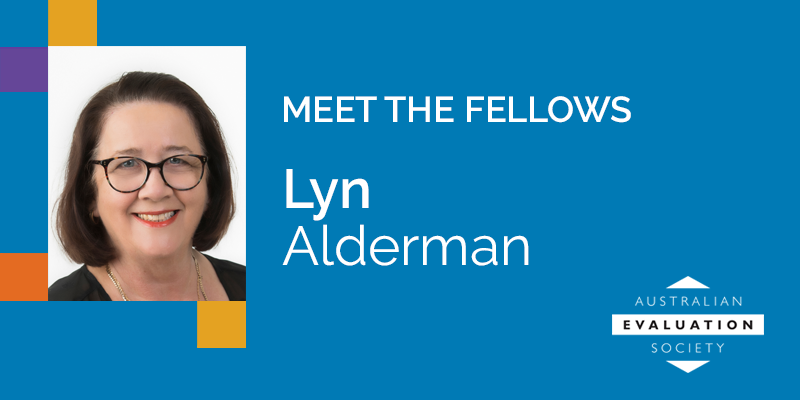Welcome to the AES Blog
In conversation with AES Fellow Lyn Alderman
Members who have made a long-term and wide-ranging contribution to the AES and the field of evaluation are recognised through a special category of membership called 'Fellow of the AES'.
Lyn was made a Fellow in 2021 and has been and continues to be an outstanding contributor to the AES. She has been a member since 2007, President for four years and completed six years as Editor of the Evaluation Journal of Australasia contributing 35 articles in the Journal (articles, book reviews). Lyn has been in the evaluation profession for over 30 years. Presently she is Dean Academic Transformation University of Southern Queensland.
Tell me what brought you into the field of evaluation?
|
I started my career in higher education at Newcastle University in a professional role then spent ten years in Sydney teaching in vocational educational. After moving back to Newcastle, I found a role assessing computer literacy on trainee teachers (at the time, the New South Wales Department of Education required that prospective graduate teachers would not be interviewed unless they were competent in computer literacy). In 2002-05 I was employed as a curriculum writer at the School of Architecture and Construction Management at Newcastle, so I was evaluating curriculum, and looking at how to improve the student’s experience. This piqued my curiosity and although I originally wanted to do my PhD in teacher evaluation, I found that there was an absence in the documentation of higher education sector review and reform packages. So, I started my master’s in research in the academic sector, then in 2005 started my PhD. I moved into evaluation through my doctoral studies and came into it through a research pathway. There was a review of education in 2002, including an education reform package in 2003, so I evaluated that reform package as my topic. The other thing I did was to collect employment opportunities for academics, one was a job at Queensland University of Technology (QUT) looking at what to do with student experience survey data, so I moved to Brisbane during my doctoral studies (commuted between Newcastle and Brisbane for 5 years). This meant I was studying and working in the field of evaluation. In 2007 I found my tribe in the Australian Evaluation Society, which I hadn’t found in higher education. I first attended the AES Conference in Perth in 2007, then most conferences since. So, I found a home as an evaluator, as well as a career. I was also curious about why evaluation seemed to be perceived as a punitive measure. |
In terms of your evaluation expertise what do you regard as your main areas of interest?
|
After ten years as the lead evaluator at Queensland University of Technology, I moved to become the Chief Evaluator with the Australian Department of Social Services. As the Chief Evaluator I found it interesting that while applying my knowledge of evaluation I was also drawn into intervention design where I applied my adult education background as well. I have 35 years in higher education and ten years in evaluation; there was a natural symmetry between curriculum in education and intervention design in social services. All require evaluation; all require validity and integrity; and require us to ensure that we do no harm. Both educational curriculum and social programs are focused on behavioural change for students and clients to engender positive change. . |
Looking back over your career, what have been the major challenges to your practice?
|
The challenge is always the cost, time, and effort. In the Australian Department of Social Services, we were successful in getting funding for evaluation. However, as evaluation is often expended at the end of a program, the challenge is to maintain the executive support to protect the evaluation funding should there be a shortfall in the program budget. The other critical issue is that evaluation results are often behind closed doors – unless you publish in a journal, evaluation reports just disappear.
In my current role, we publish everything. It is reasonably easy to publish, our philosophy is to write once and use many times. Evaluators do themselves a disservice by not contributing to literature. Sometimes the report goes into the public domain. Unless it’s in a journal it becomes grey literature. This is one of my pet things – the need to publish! |
What have been the highlights in your evaluation career?
|
Being President of the Australian Evaluation Society for four years during the UNESCO 2015 Year of Evaluation and Editor of the Evaluation Journal of Australasia for six years were evaluation career highlights for me. Everyone respected each other. We were so in tune with each other, and we were very proud to launch the first Reconciliation Action Plan. In my current role as Dean, Academic Transformation at the University of Southern Queensland I am proud of the UniSQ Graduate Employment Program where graduates of the university are employed as Associate Evaluation Officers for a one-year full-time or a two-year part-time contract (16 to date). This, together with establishing an Evaluation Methodologies team to conduct Environmental Analytic Scans across over 70 higher education disciplines to assist academic decision making, continue to create career highlights. Evaluation is an ethical and honourable profession, and all evaluators should proudly introduce themselves to everyone as a proud evaluator! |
What have been the major influence(s) which have helped to define your evaluation practice?
|
At the end of his career, my dad was an electrical engineer in the Victorian State Government as a Chief Inspector of Lifts and Cranes. We talked a lot about standards around the dinner table and I have always been conscious that standards matter – also that quality matters. For example, tamper with the quality of a crane and any subsequent accident may be fatal to the crane driver. I went to the Philippines at 16 years of age on my own as an exchange student with Rotary for one year. It sets you up to be independent and more resilient. When our youngest child had cancer as a four-year-old, my husband and I managed to cope by getting by day-to-day and hoping that one of us was listening to the medical advice. We had both had to demonstrate resilience to survive. Over my career, I have also realised that I am more interested in doing things that are interesting and which make me curious. Having your mind engaged and to employ critical thinking is essential. Evaluation to me is always different, it has a unique approach, you need a range of tools, as well as to meet the needs of everything and everybody. The discipline ticks all my boxes. It suits my enquiring mind not to have any bias when you walk in. Some of our graduates ask, “what is the hypothesis?” I say no we don’t have one, we are going in open minded. I tell them to suspend idea of a hypothesis. Evaluation suits my way of thinking, as every evaluation stretches your mind and adds a layer of experience. |
What are the main skills or competencies that evaluators need to have or develop to keep pace with emerging trends in evaluation practice?
|
Evaluators have to have research skills to be able to produce good data, and to analyse the results. We need good quantitative skills to support qualitative information, to allow us to tell the full story. At times, evaluators need to talk truth to power in a positive but constructive manner. Evaluators need to reflect on each evaluation and allow their evaluator’s voice to grow and mature over time. It is an evaluator’s responsibility to be constructive in their messaging, to include all available data, be inclusive of stakeholders, and make expert objective decisions. When it comes to keeping pace with emerging trends in evaluation practice, evaluators should be across the academic literature and practice, and I would encourage all evaluators to contribute to the literature |
How can we as evaluators promote evaluation as a discipline?
|
In a special issue of the Evaluation Journal of Australasia, there is an article that describes the current state of evaluation education offerings in Australia (Quadrelli, Cook-Watkins, Staheli and Alderman, 2022). Evaluation skills and knowledge are useful in any discipline and an argument could be mounted that evaluation should be embedded in all undergraduate degrees. Another direction is to attract more students into the research pathway of a master’s or Doctor of Philosophy. Each evaluator should take the initiative to publish in the academic literature and contribute to the discipline of evaluation. My staff at the University of Southern Queensland are attending AES workshops and seminars. We had an emerging evaluator who got a scholarship last year, and we have another one this year. So, we are supporting the emerging evaluators who are supporting a pipeline of evaluations. |
How can the society best position itself to be still relevant in the future?
|
The AES continues to lead in the First Nations space and there is wide ranging evidence that the society has embedded First Nations professional development over time through different avenues. This is exemplary work. I think the AES responded well to COVID with the introduction of online workshops that have been sustained post COVID. The society needs to maintain its independent voice to promote evaluation more broadly and offer professional development opportunities into the future. The introduction of the Treasury’s Australian Centre for Evaluation will pose an interesting opportunity for advocacy and collaboration. |
What advice would you give to a young emerging evaluator?
|
Act like a curious sponge! |
------------------------
Anthea Rutter
Anthea is Research Fellow, Assessment and Evaluation Research Centre.


